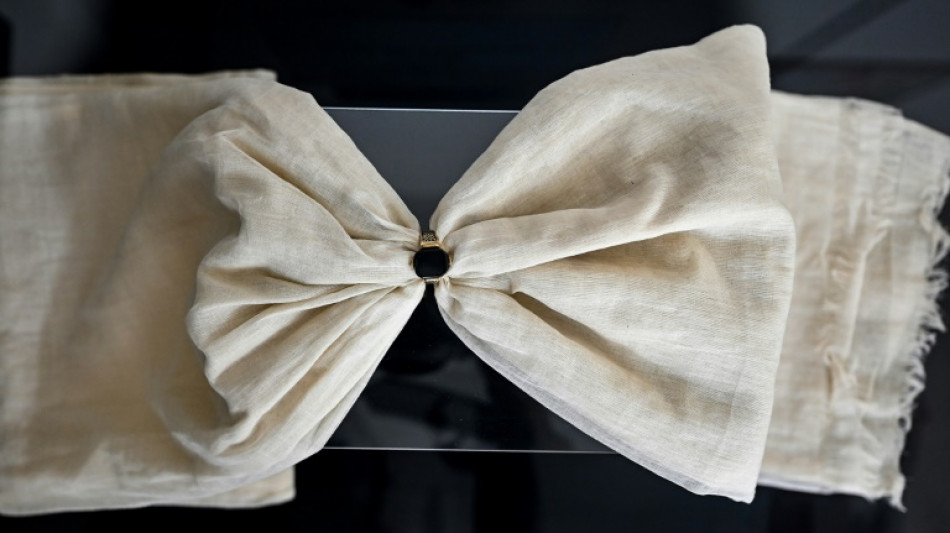
-
 'Devastated' Australian tennis star Purcell provisionally suspended for doping
'Devastated' Australian tennis star Purcell provisionally suspended for doping
-
Mozambique on edge as judges rule on disputed election

-
 Mobile cinema brings Tunisians big screen experience
Mobile cinema brings Tunisians big screen experience
-
Philippines says to acquire US Typhon missile system

-
 Honda and Nissan to launch merger talks
Honda and Nissan to launch merger talks
-
Police arrest suspect who set woman on fire in New York subway

-
 China vows 'cooperation' over ship linked to severed Baltic Sea cables
China vows 'cooperation' over ship linked to severed Baltic Sea cables
-
Australian tennis star Purcell provisionally suspended for doping

-
 Asian markets track Wall St rally as US inflation eases rate fears
Asian markets track Wall St rally as US inflation eases rate fears
-
Luxury Western goods line Russian stores, three years into sanctions

-
 Wallace and Gromit return with comic warning about AI dystopia
Wallace and Gromit return with comic warning about AI dystopia
-
Philippine military says will acquire US Typhon missile system

-
 Afghan bread, the humble centrepiece of every meal
Afghan bread, the humble centrepiece of every meal
-
Honda and Nissan expected to begin merger talks

-
 'Draconian' Vietnam internet law heightens free speech fears
'Draconian' Vietnam internet law heightens free speech fears
-
Israeli women mobilise against ultra-Orthodox military exemptions

-
 Asian markets track Wall St rally as US inflation eases rate worries
Asian markets track Wall St rally as US inflation eases rate worries
-
Tens of thousands protest in Serbian capital over fatal train station accident

-
 Trump vows to 'stop transgender lunacy' as a top priority
Trump vows to 'stop transgender lunacy' as a top priority
-
Daniels throws five TDs as Commanders down Eagles, Lions and Vikings win

-
 'Who's next?': Misinformation and online threats after US CEO slaying
'Who's next?': Misinformation and online threats after US CEO slaying
-
Only 12 trucks delivered food, water in North Gaza Governorate since October: Oxfam

-
 InterContinental Hotels Group PLC Announces Transaction in Own Shares - December 23
InterContinental Hotels Group PLC Announces Transaction in Own Shares - December 23
-
Melrose Group Publicly Files Complaint to the Ontario Securities Commission

-
 Langers edge Tiger and son Charlie in PNC Championship playoff
Langers edge Tiger and son Charlie in PNC Championship playoff
-
Explosive batsman Jacobs gets New Zealand call-up for Sri Lanka series

-
 Holders PSG edge through on penalties in French Cup
Holders PSG edge through on penalties in French Cup
-
Slovak PM Fico on surprise visit to Kremlin to talk gas deliveries

-
 Daniels throw five TDs as Commanders down Eagles
Daniels throw five TDs as Commanders down Eagles
-
Atalanta fight back to take top spot in Serie A, Roma hit five

-
 Mancini admits regrets over leaving Italy for Saudi Arabia
Mancini admits regrets over leaving Italy for Saudi Arabia
-
Run machine Ayub shines as Pakistan sweep South Africa

-
 Slovak PM Fico on surprise visit to Kremlin
Slovak PM Fico on surprise visit to Kremlin
-
Gaza rescuers say Israeli strikes kill 35

-
 'Incredible' Liverpool must stay focused: Slot
'Incredible' Liverpool must stay focused: Slot
-
Maresca 'absolutely happy' as title-chasing Chelsea drop points in Everton draw

-
 Salah happy wherever career ends after inspiring Liverpool rout
Salah happy wherever career ends after inspiring Liverpool rout
-
Three and easy as Dortmund move into Bundesliga top six

-
 Liverpool hit Spurs for six, Man Utd embarrassed by Bournemouth
Liverpool hit Spurs for six, Man Utd embarrassed by Bournemouth
-
Netanyahu vows to act with 'force, determination' against Yemen's Huthis

-
 Mbappe back from 'bottom' as Real Madrid down Sevilla
Mbappe back from 'bottom' as Real Madrid down Sevilla
-
Ali hat-trick helps champions Ahly crush Belouizdad

-
 France kept on tenterhooks over new government
France kept on tenterhooks over new government
-
Salah stars as rampant Liverpool hit Spurs for six

-
 Syria's new leader says all weapons to come under 'state control'
Syria's new leader says all weapons to come under 'state control'
-
'Sonic 3' zips to top of N.America box office

-
 Rome's Trevi Fountain reopens to limited crowds
Rome's Trevi Fountain reopens to limited crowds
-
Mbappe strikes as Real Madrid down Sevilla

-
 'Nervous' Man Utd humiliated by Bournemouth
'Nervous' Man Utd humiliated by Bournemouth
-
Pope again condemns 'cruelty' of Israeli strikes on Gaza


'Woven air': Bangladesh revives elite forgotten fabric
With wooden spinning wheels and hand-drawn looms, Bangladesh is painstakingly resurrecting a fabric once worn by Marie Antoinette and Jane Austen but long thought forever lost to history.
Dhaka muslin was stitched from threads so fine that popular folklore in European parlours held that a change in the light or a sudden rain shower would render its wearer apparently naked.
The textile once brought magnificent riches to the lands where it was spun.
But to revive it, botanists had to hunt halfway across the world and back for a plant believed gone from the face of the earth.
"Nobody knew how it was made," said Ayub Ali, a senior government official helping shepherd the revival project.
"We lost the famous cotton plant, which provided the special fine yarn for Dhaka muslin," he told AFP.
The muslin trade at one time helped turn the Ganges delta and what is now Bangladesh into one of the most prosperous parts of the world, historians say.
Flowing dress garments weaved from the cloth were worn by generations of the Mughal dynasty then ruling India before the fabric enchanted European aristocrats and other notables at the end of the 18th century.
A muslin shawl belonging to Austen -- supposedly hand-embroidered by the "Pride and Prejudice" author herself -- is on display at her former home in Hampshire, while a 1783 portrait of Marie Antoinette depicts the French queen in a muslin dress.
But the industry collapsed in the years after the 18th century conquest of the Bengal delta by the East India Company, paving the way for British colonial rule.
The mills and factories that sprung up in England after the industrial revolution produced much cheaper textiles, while European tariffs killed the foreign market for the delicate fabric.
- 'Rare and possibly extinct' -
The quest to bring back Bangladeshi muslin began with a painstaking five-year search for the specific flower used to weave the fabric, which only grows near the capital Dhaka.
"Muslin can't be woven without Phuti Carpus cotton. So to revive Dhaka Muslin, we needed to find this rare and possibly extinct cotton plant," said Monzur Hossain, the botanist who led the effort.
His team consulted a seminal book on plants by the 18th century Swedish naturalist Carl Linnaeus along with a later historical tome on Dhaka muslin to narrow down a candidate among 39 different wild species collected from around Bangladesh.
With local museums lacking any specimen of Dhaka muslin clothing, Hossain and his colleagues went to India, Egypt and Britain for samples.
At the Victoria and Albert Museum in London, curators showed them hundreds of pieces imported from Mughal-era Dhaka by East India Company merchants.
Genetic samples revealed that the missing plant was already in their hands, found by the botanists in the riverside town of Kapasia north of the capital.
"It was a 100 percent match, and some history books say Kapasia was one of the places where Phuti Carpus was grown," Hossain told AFP.
The plant is now being grown in experimental farms in an effort to raise yields and scale up production.
- 'Like doing prayers' -
But the revival project immediately ran into another roadblock -- finding weavers nimble enough to weave the plant's ultra-fine threads.
In the two centuries since the muslin trade collapsed, Bangladesh has again become a world textile hub, albeit with an industry no longer catering to royalty or other international elites.
Instead Dhaka is now home to countless bustling factories of the global fast fashion trade, supplying huge brands such as H&M and Walmart, with its $35 billion in yearly apparel exports second only to China.
The country has no shortage of garment workers, but the muslin project needed to source artisans from the small cottage industry of spinners and weavers working with fragile threads.
They found candidates from villages around Dhaka where small workshops make intricate saris from jamdari, a fine cotton produced in a similar way to muslin.
"I don't how I did it. But it needs supreme concentration," said Mohsina Akhter, one of the spinners brought into the project.
"To do it you have to be in perfect mind. If you are angry or worried, you can't hand spin such a fine yarn."
It took months for the team to master the craft, working with threads four or more times finer than jamdari, with two people taking eight hours of non-stop labour to weave an inch or less of cloth.
"It is like doing prayers. You need to have full concentration. Any lapse will tear up the yarn and set your work backwards," said Abu Taher, a weaver.
"The more I work, the more I wonder how our ancestors wove such a fine clothing. It is almost impossible," he told AFP.
The intense labour needed means that any garments stitched from Dhaka muslin will always remain a boutique product, but the government has found some tentative interest from established industry players.
"We want to make it a top global fashion item. It has a great history," said Parvez Ibrahim, whose family owns a factory supplying global fashion retailers.
"But to bring down cost, we have to speed up the production process. Otherwise, reviving Dhaka muslin won't mean anything," he told AFP.
P.Stevenson--AMWN
